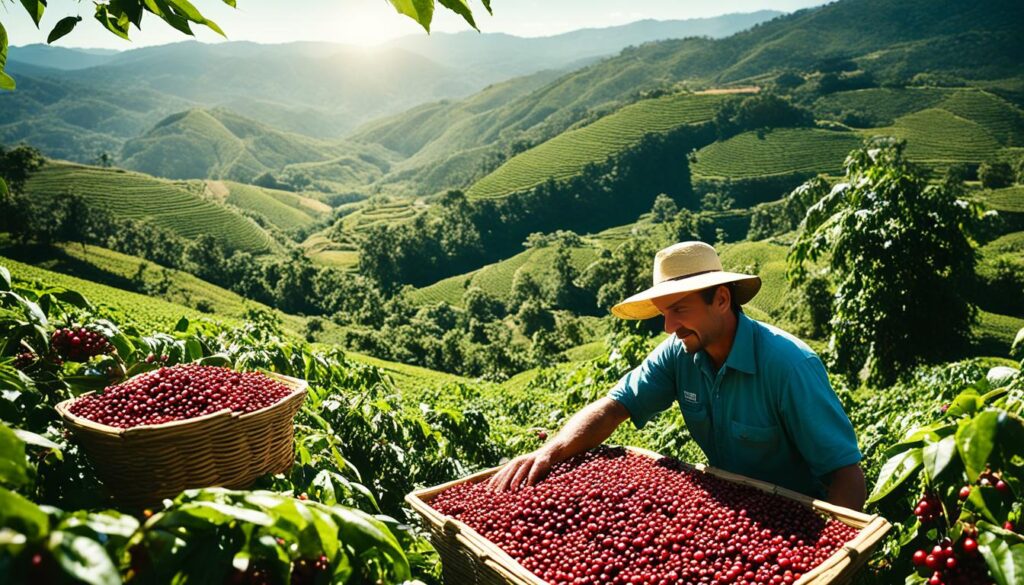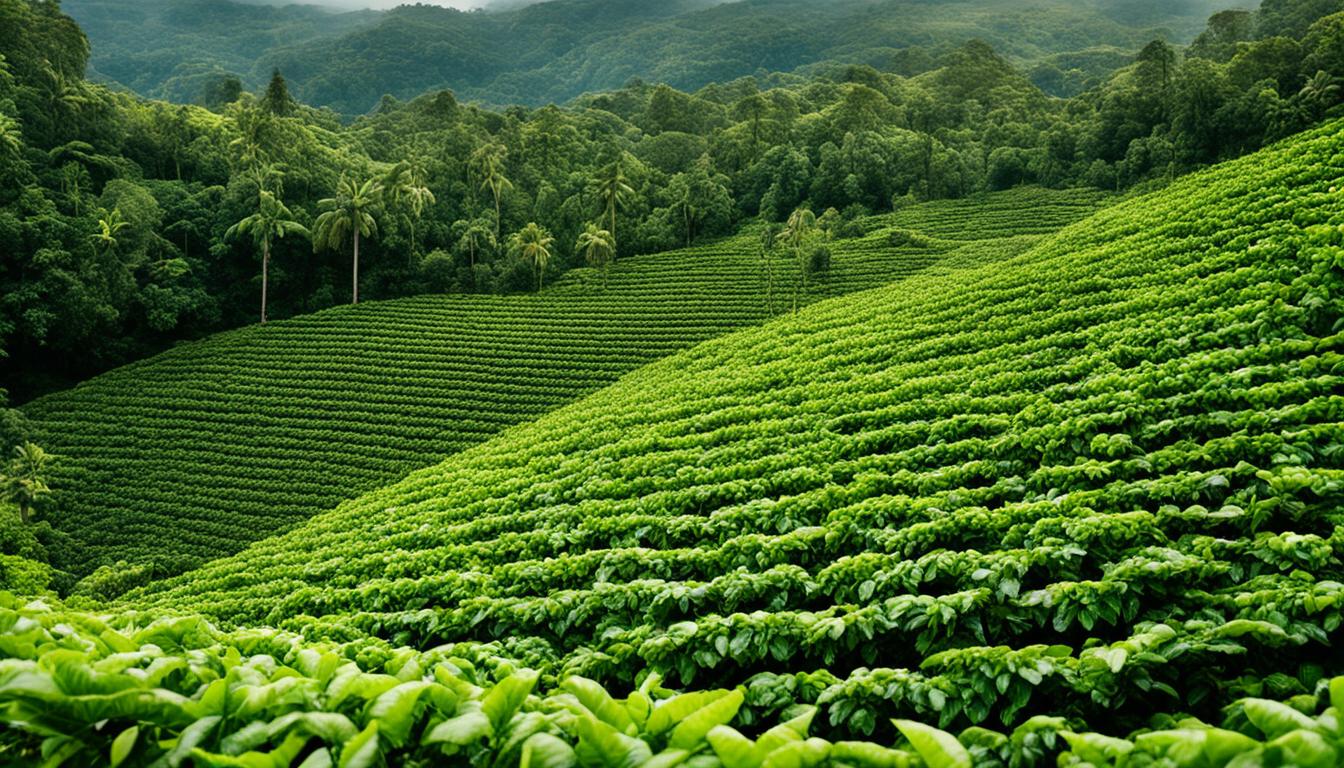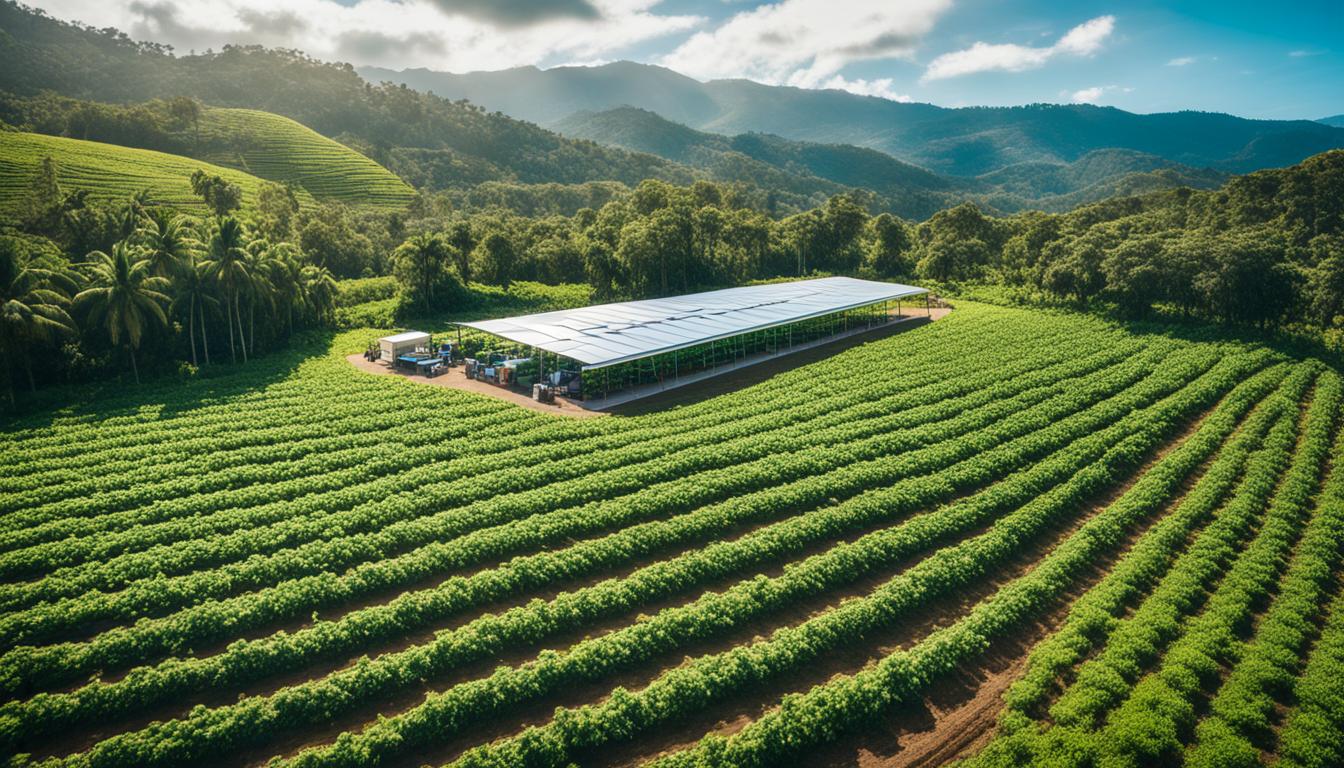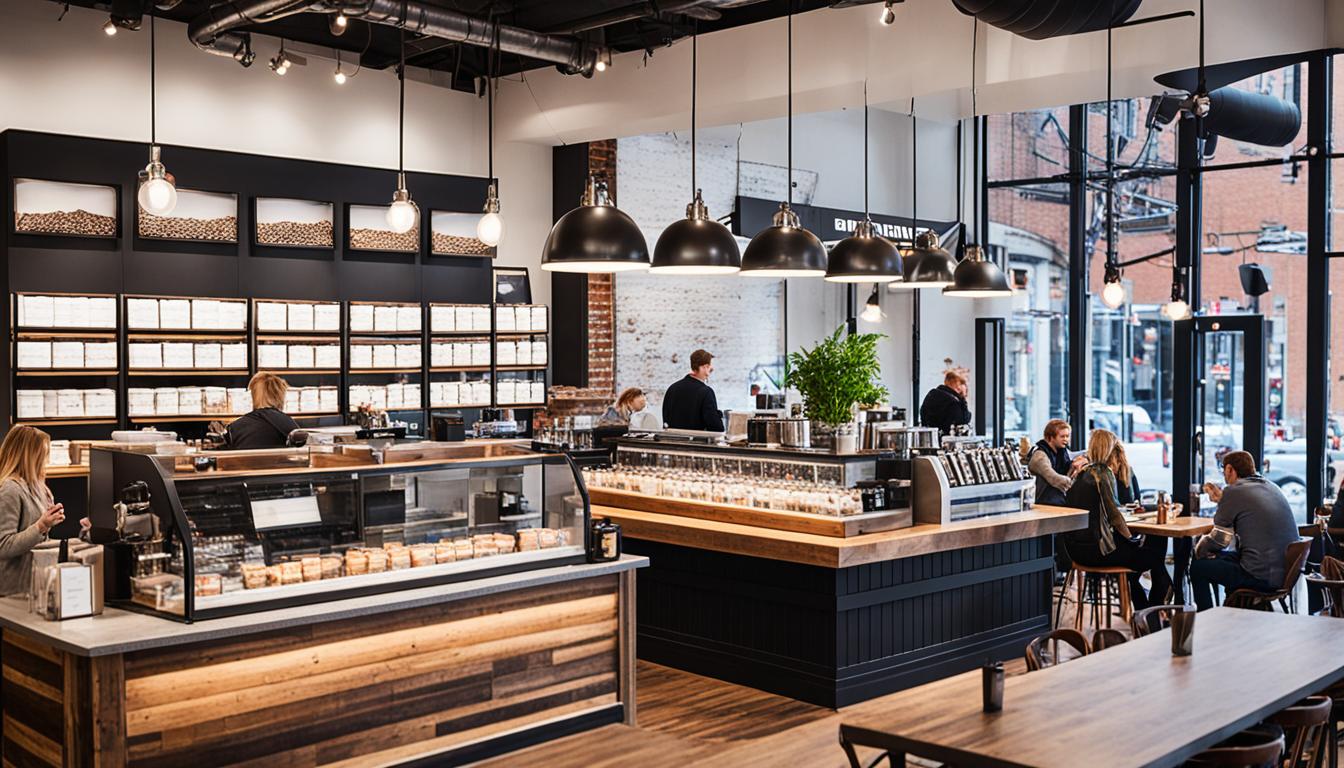As the demand for coffee continues to rise, so does the need for sustainable practices in its production. Sustainability in coffee farming, environmentally friendly cultivation methods, and ethical growing practices are becoming key considerations for both coffee industry players and consumers alike.
Customers are increasingly aware of the environmental impact of their choices and are seeking brands that align with their values. In response to this growing demand, coffee companies are working towards implementing sustainable solutions to minimize their ecological footprint.
B Corp certification is one recognition that showcases a brand’s dedication to environmental values and social responsibility. Several coffee companies have embraced sustainability as a core part of their ethos and have achieved B Corp certification. Notable examples include Five Senses, Hasbean Coffee, Minor Figures, and Marco Beverage Systems.
Key Takeaways:
- Sustainability is a crucial consideration in coffee production, encompassing farming methods, cultivation practices, and ethical growth.
- Consumers prioritize brands that demonstrate a commitment to sustainability and environmental responsibility.
- B Corp certification recognizes companies dedicated to environmental values and social responsibility.
- Five Senses, Hasbean Coffee, Minor Figures, and Marco Beverage Systems are leading examples of B Corp-certified companies embracing sustainability.
- The coffee industry is working towards implementing sustainable solutions to minimize its ecological impact.
The Importance of Embracing Sustainable Solutions in the Coffee Industry
The coffee industry plays a significant role in global paper and plastic cup waste, making it crucial to adopt sustainable solutions. By embracing eco-friendly coffee production methods and socially responsible farming practices, the industry can minimize its carbon footprint and contribute to a more sustainable coffee supply chain.
Sustainable solutions in the coffee industry are essential not only for environmental preservation but also for addressing pressing issues such as deforestation, water pollution, and worker exploitation. One approach to promoting sustainable practices is through B Corp certification, which assesses companies based on their governance, treatment of workers, impact on communities, environmental initiatives, and customer engagement.
B Corp-certified companies like Five Senses Coffee, Hasbean Coffee, and Minor Figures have achieved high scores, showcasing their commitment to sustainable practices and environmental responsibility. With their dedication to eco-friendly coffee production, these companies are leading the way in creating a more sustainable coffee industry.
The Five Impact Areas of B Corp Certification
“Governance, Workers, Community, Environment, and Customers are the five impact areas that B Corp certification focuses on. By excelling in these areas, companies contribute to creating a sustainable coffee industry.”
| Company | Country | B Corp Score |
|---|---|---|
| Five Senses Coffee | Australia | 90 |
| Hasbean Coffee | United Kingdom | 87 |
| Minor Figures | United Kingdom | 93 |
Sustainable Solutions in the Coffee Industry: Innovative Examples
When it comes to sustainability in the coffee industry, several innovative companies are leading the way with their commitment to organic coffee farming and fair trade coffee production. These companies set themselves apart by embracing environmentally friendly practices and prioritizing social responsibility.
Five Senses: Environmental and Social Excellence
Five Senses is a B Corp-certified company that has been recognized for both its high-quality coffee beans and its dedication to environmental and social excellence. Their commitment to organic coffee farming ensures that their coffee is cultivated without the use of harmful chemicals or synthetic fertilizers. By choosing organic farming methods, Five Senses supports the health of both the environment and the workers involved in the coffee production process.
Hasbean Coffee: Ethical Sourcing and Transparency
Hasbean Coffee, a specialty coffee roaster based in the UK, is known for its commitment to transparency in the coffee supply chain and ethical sourcing practices. They work closely with coffee growers around the world to ensure fair trade practices, providing a sustainable livelihood for farmers while offering consumers high-quality, responsibly sourced coffee.
Minor Figures: Plant-Based Alternatives
Minor Figures is a beverage company that goes beyond coffee production and offers plant-based alternatives like oat milk and cold brew coffee. By providing options that are both environmentally friendly and delicious, Minor Figures gives consumers the opportunity to make sustainable choices without compromising on taste.
Marco Beverage Systems: Environmentally Conscious Solutions
Marco Beverage Systems is dedicated to creating environmentally conscious solutions for the coffee industry. Their products, such as FRIIA and MIX, are designed to minimize energy consumption and reduce water waste. By incorporating these innovative systems, coffee shops and businesses can significantly decrease their ecological impact while still delivering exceptional coffee experiences to customers.
These companies are prime examples of how sustainable solutions can be implemented in the coffee industry. Through their focus on organic coffee farming, fair trade practices, and innovative approaches, they are shaping a more environmentally friendly and socially responsible future for the coffee industry.

How to Approach Sustainable Ideas for the Coffee Industry
Sourcing coffee responsibly is a key step in promoting environmental conservation. By partnering with farms that advocate ethical and sustainable practices, coffee industry players can support initiatives that prioritize the well-being of both the planet and the community it sustains.
To further reduce waste, coffee businesses can encourage customers to bring reusable cups. Implementing recycling programs within cafes and partnering with local recycling facilities can also make a significant impact. By working together, we can minimize the amount of coffee-related waste that ends up in landfills.
Educating customers about sustainable practices is crucial in driving positive change. By providing information on the environmental impact of different coffee production methods and promoting eco-friendly choices, we can raise awareness and inspire more conscious consumption.
In addition, supporting sustainable organizations that work towards improving the environment and livelihoods of coffee growers is essential. By contributing to these organizations, the coffee industry can play a proactive role in creating a more sustainable and equitable future for all.
By adopting these strategies, coffee businesses can demonstrate their commitment to sustainability, attracting environmentally conscious consumers and making a positive difference in the industry.
Conclusion
Embracing sustainability is crucial for creating a responsible and environmentally friendly coffee industry. By adopting sustainable practices, coffee companies can not only reduce their ecological footprint but also meet the growing demand for ethically produced coffee.
Key sustainable approaches include responsible sourcing, which involves partnering with coffee farms that prioritize environmentally friendly cultivation methods and fair treatment of workers. Recycling initiatives, such as promoting reusable cups and implementing comprehensive recycling programs, help minimize waste and protect the environment.
Customer education plays a vital role in fostering environmentally friendly coffee practices. By raising awareness about the importance of sustainable coffee production, consumers can make informed choices that support ethical brands and create a positive impact on the planet.
Companies like Five Senses, Hasbean Coffee, Minor Figures, and Marco Beverage Systems are shining examples of sustainability in action. They lead the way by implementing innovative environmentally friendly coffee practices and setting industry standards for others to follow.
By prioritizing sustainable coffee production, the industry can pave the way for a brighter and more sustainable future. Together, through responsible sourcing, recycling initiatives, customer education, and eco-friendly equipment choices, we can create a coffee industry that supports both people and the planet.
FAQ
What is sustainable coffee farming?
Sustainable coffee farming refers to environmentally friendly coffee cultivation practices that prioritize the long-term health and well-being of both the ecosystem and the communities involved in coffee production. It involves minimizing the use of chemicals, promoting biodiversity, conserving water, and ensuring fair treatment of workers.
Why is sustainability important in the coffee industry?
Sustainability is crucial in the coffee industry for several reasons. Firstly, it helps minimize the ecological impact of coffee production by reducing waste, conserving resources, and promoting responsible farming practices. Secondly, customers are increasingly concerned about the sustainability practices of the brands they choose, making it a business imperative. Lastly, sustainability ensures a more equitable and socially responsible industry that benefits both the environment and coffee-growing communities.
Can you provide examples of companies embracing sustainability in the coffee industry?
Yes, certainly! Five Senses Coffee, Hasbean Coffee, Minor Figures, and Marco Beverage Systems are all examples of B Corp-certified companies that embrace sustainability in their operations. These companies have demonstrated their commitment to environmental values, social responsibility, and ethical practices.
What are some innovative examples of sustainable solutions in the coffee industry?
There are several innovative examples of sustainable solutions in the coffee industry. For example, Five Senses Coffee, Hasbean Coffee, and Minor Figures have achieved high scores as B Corp-certified companies, thanks to their commitment to sustainability. Marco Beverage Systems provides environmentally conscious solutions like FRIIA and MIX, which minimize energy consumption and reduce water waste. These companies are leading the way in sustainable coffee production.
How can the coffee industry approach sustainable ideas?
The coffee industry can approach sustainable ideas by sourcing coffee responsibly from farms that advocate ethical and sustainable practices. It can also implement recycling programs and encourage customers to bring reusable cups to reduce waste. Educating customers about sustainable practices raises awareness and promotes eco-friendly choices. Additionally, supporting sustainable organizations working to improve coffee growers’ environment and livelihoods is crucial.
Why is embracing sustainability essential for the coffee industry?
Embracing sustainability is essential for the coffee industry to become a responsible and environmentally friendly sector. By adopting sustainable approaches such as responsible sourcing, implementing recycling initiatives, educating customers, and making eco-friendly equipment choices, the industry can minimize its ecological footprint and address pressing environmental and social issues. This will contribute to a brighter and more sustainable future for coffee production.




